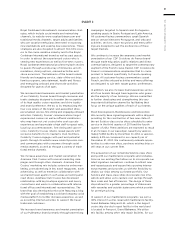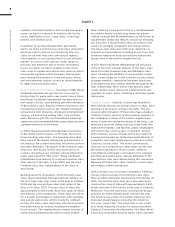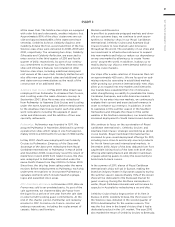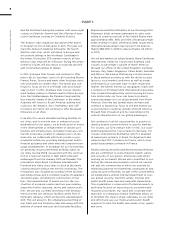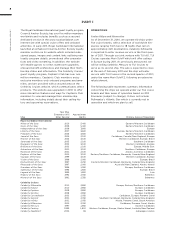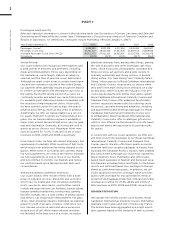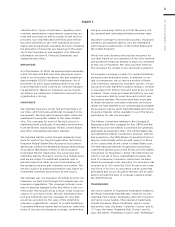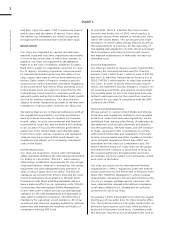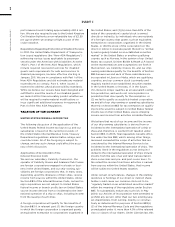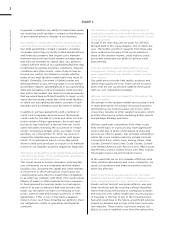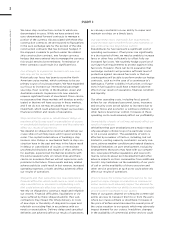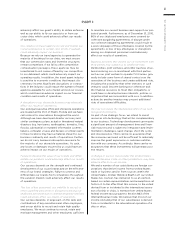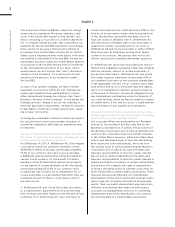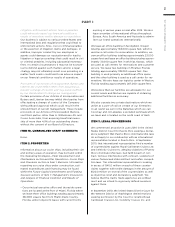Royal Caribbean Cruise Lines 2010 Annual Report Download - page 26
Download and view the complete annual report
Please find page 26 of the 2010 Royal Caribbean Cruise Lines annual report below. You can navigate through the pages in the report by either clicking on the pages listed below, or by using the keyword search tool below to find specific information within the annual report.
PART I
ROYAL CARIBBEAN CRUISES LTD. 23
marine gas oil. This has not had a material effect on
our fuel and operating costs.
The MARPOL Regulations impose global limitations
on the sulfur content of fuel used by ships operating
worldwide, which are currently 4.5% and are required
to be reduced to 3.5% by January 1, 2012. We do not
expect that this required reduction will have a mate-
rial effect on our fuel and operating costs. These
regulations will also require the worldwide limitations
on sulfur content of fuel to be reduced to 0.5% by
January 1, 2020, subject to a feasibility review to be
completed by IMO no later than 2018. If such a reduced
limitation is implemented worldwide in 2020, our fuel
costs could increase significantly.
The MARPOL Regulations also establish special
Emission Control Areas (“ECAs”) with stringent
limitations on sulfur and nitrogen oxide emissions in
these areas. As of July 1, 2010, ships operating in des-
ignated ECAs were required to reduce their fuel sulfur
content from 1.5% to 1.0%. Under these regulations,
ships operating in ECAs will be required to further
reduce their fuel sulfur content to 0.1% beginning on
January 1, 2015.
As of the date of this report, both the Baltic Sea and
the North Sea/English Channel have been established
as ECAs. During 2010, the IMO accepted and adopted
the application by the United States, France and
Canada to designate as an ECA waters within 200
nautical miles of their east, west and gulf coasts, as
applicable, as well as the Hawaiian Islands, but exclud-
ing certain areas within the Caribbean Basin such as
the Bahamas, the Canadian Arctic, Western Alaska
and the Aleutian Islands. This designation will be
effective as of August 1, 2012. In addition, the United
States has applied to designate the waters surround-
ing Puerto Rico and the U.S. Virgin Islands as an ECA.
This request was approved by the IMO at the Marine
Environment Protection Committee in September 2010.
If adopted, this ECA would likely come into effect
during the summer of 2013.
As of the date hereof, the required sulfur content
reductions in the existing ECAs has not had a material
impact on our operations and we do not expect the
initial required sulfur content reductions in either the
United States and Canadian ECA or the proposed
Puerto Rico/U.S. Virgin Islands ECA will have a material
effect on our fuel and operating costs. However, the
additional reduction to 0.1% as of January 1, 2015
could significantly increase our costs after this date
based on current capacities, fuel prices, itineraries
and technologies. The cost impact from implementing
progressively lower sulfur content requirements after
January 1, 2015 is not reasonably determinable given
the length of time until such possible implementation
and the applicability of many possible mitigating
factors, such as changes in the future supply and
demand for fuel, the development of emissions abate-
ment technologies, including new engine designs or
exhaust gas treatment systems, the cost migration
effects of equivalent compliance initiatives and new
fuel conservation initiatives.
We are required to obtain certificates from the United
States Coast Guard relating to our ability to satisfy
liability in cases of water pollution. Pursuant to United
States Coast Guard regulations, we arrange through
our insurers for the provision of guarantees aggregat-
ing $347.2 million as a condition to obtaining the
required certificates.
Labor Regulations
The International Labour Organization, an agency of
the United Nations that develops worldwide employ-
ment standards, has adopted a new Consolidated
Maritime Labour Convention (the “Convention”). The
Convention, which will be effective one year following
ratification by at least 30 countries representing at
least 33% of the world gross tonnage, reflects stan-
dards and conditions to govern all aspects of crew
management for ships in international commerce,
including additional requirements relating to the
health, safety and status of crewmembers not previ-
ously in effect. The Convention is expected to be rati-
fied sometime in 2011, in which case it would enter into
force in 2012. Our expenses will likely increase follow-
ing its effectiveness; however, the amount of the
increase is not reasonably determinable pending the
enactment of legislation to implement new standards
outlined in the Convention by the enacting countries.
Consumer Financial Responsibility Regulations
We are required to obtain certificates from the United
States Federal Maritime Commission relating to our
ability to satisfy liability in cases of non-performance
of obligations to guests, as well as casualty and per-
sonal injury. Pursuant to the United States Federal
Maritime Commission regulations, we arrange through
our insurers for the provision of guarantees aggregat-
ing $30.0 million for our ship-operating companies as
a condition to obtaining the required certificates. In
December 2009, the United States Federal Maritime
Commission issued an inquiry to solicit information
concerning the benefits and burdens of the financial
responsibility regulations which could result in
enactment of revisions to the regulations that could
significantly increase the amount of our bonds and
accordingly increase our costs of compliance.
We are also required by the United Kingdom and other
jurisdictions to establish our financial responsibility
for any liability resulting from the non-performance
of our obligations to guests from these jurisdictions.
In the United Kingdom, we are currently required by
the Association of British Travel Agents to provide


